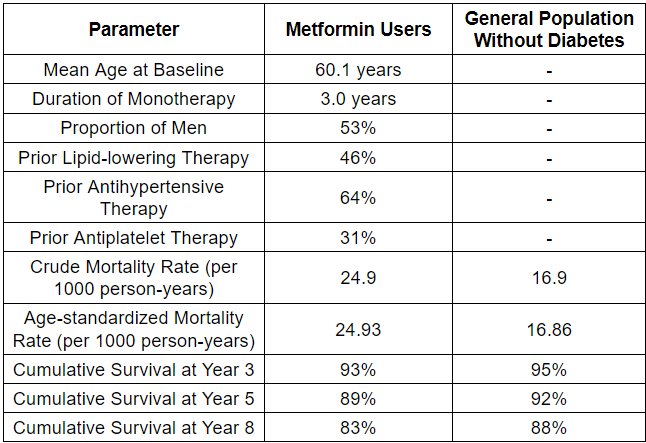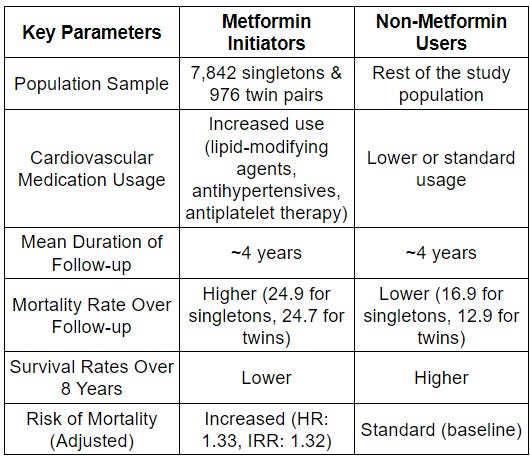Metformin and Type 2 Diabetes: A Fresh Perspective
Is the Diabetes Drug Metformin the Magic Fountain of Youth or a Medical Mirage? Find Out Now!
For many of us, the term "Type 2 diabetes" is familiar. It's a condition that affects millions worldwide, and research is always ongoing to find the best treatments. One such treatment that has been in the spotlight is metformin. But what does the latest research say about this drug? Let's dive in and explore.
The Previous Buzz
We’ve talked about metformin and its relationship with anti-aging a while back. Also, a study from the UK suggested that people with Type 2 diabetes who started their treatment with metformin alone had a lower chance of dying compared to those without diabetes. This was a surprising and promising discovery. It even led some to believe that metformin could be a "geroprotector" - a drug that could help us age better and live longer.
The New Findings
However, a recent study from Denmark has given us a different perspective.1 This study found that people with new-onset Type 2 diabetes who started on metformin didn't have a survival advantage. In fact, they had a higher risk of dying compared to those without diabetes of the same age and gender. This was true even when considering other health factors and family history.
The Big Picture: Researchers in Denmark took a close look at a bunch of people - 445,662 single folks and 151,091 twins to be exact. They wanted to see how metformin affects people with Type 2 diabetes compared to those without it.
The Starting Lineup: After some filtering (like removing youngsters under 18 and folks who left Denmark), they had 216,916 single folks and 19,763 twin pairs ready for the study. They then compared people with diabetes taking metformin to those without diabetes.
What They Found:
Medication Galore: People with diabetes, whether single or twins, took more heart-related medicines than their non-diabetic counterparts.
The Clock's Ticking: On average, they followed single folks for 4.2 years and twins for 4.1 years. Those with diabetes on metformin had a higher chance of dying during the study than those without diabetes.
Twinning Isn't Always Winning: When comparing twins where one had diabetes and the other didn't, the diabetic twin on metformin had a higher risk of dying.
The Nitty-Gritty:
People with diabetes on metformin had a 48% higher risk of dying than those without diabetes. After considering other factors, this risk dropped a bit but was still 33% higher.
Among the twins, the diabetic one on metformin had more than double the risk of dying compared to their non-diabetic sibling. After adjusting for other factors, this risk was still 80% higher.
Dose Matters... Or Does It? The researchers also looked at how long people took metformin and how much they took. No matter the dose or duration, those on metformin had a higher risk of dying than those without diabetes.
But Wait, There's More! The researchers did a bunch of extra tests to make sure their findings were solid. They checked other factors, like if metformin was used for other conditions or if people switched medications. No matter how they sliced and diced the data, the results were consistent.
In a Nutshell: Metformin might not be the magical life-extending drug for everyone with Type 2 diabetes. But remember, every person is unique, and what works for one might not work for another.
Why the Difference?
When comparing the Danish study with the earlier UK study, many factors were similar, such as the age of participants and the duration they were on metformin. But the death rates among those on metformin were different. The reason for this difference isn't entirely clear, but it's essential to note that one study's findings don't negate the other. Research is a continuous process, and sometimes results can vary.
The Bigger Picture
Type 2 diabetes is known to reduce life expectancy and increase the risk of many diseases. Some studies have shown that controlling specific risk factors can help people with diabetes live as long as those without it. But, only a small percentage of patients can achieve this.
Metformin has been linked to many health benefits, from reducing the risk of cancers to protecting against heart diseases and even age-related conditions like dementia. But, as with all research, it's crucial to be cautious. Some of these findings have been questioned, and more research is needed.
Limitations to Consider
The Danish study had some limitations. For example, it relied on prescription data rather than actual diagnoses from doctors. There were also some assumptions made about the participants. But, every study has its limitations, and it's essential to consider the broader context.
In Conclusion
The latest research suggests that while metformin is a valuable treatment for Type 2 diabetes, it might not be the miracle anti-aging drug some hoped for. But, as always, more research is needed. It's essential to consult with healthcare professionals and stay updated with new findings.
Commentary:
The world of medical research is vast and ever-evolving. While initial findings on metformin were promising, the recent Danish study serves as a reminder that science is a journey, not a destination. It's crucial for patients and healthcare providers to stay informed and make decisions based on the most recent and comprehensive data available. The quest for understanding the full potential and limitations of metformin continues, and it's a journey we should all watch with keen interest.
Matthew Thomas Keys, Mikael Thinggaard, Lisbeth Aagaard Larsen, Dorthe Almind Pedersen, Jesper Hallas, Kaare Christensen, Reassessing the evidence of a survival advantage in Type 2 diabetes treated with metformin compared with controls without diabetes: a retrospective cohort study, International Journal of Epidemiology, Volume 51, Issue 6, December 2022, Pages 1886–1898, https://doi.org/10.1093/ije/dyac200





